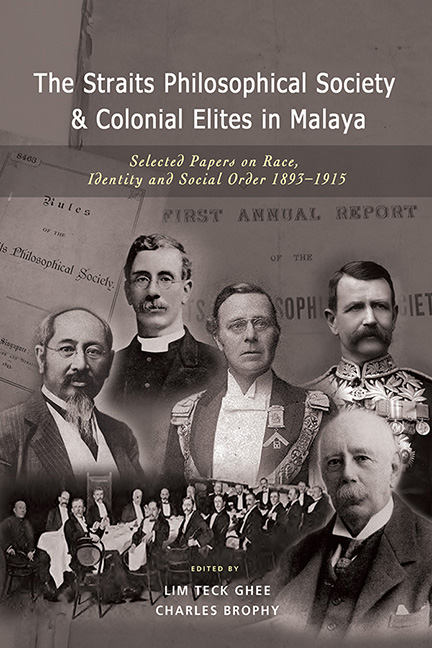 The Straits Philosophical Society and Colonial Elites in Malaya
The Straits Philosophical Society and Colonial Elites in Malaya Published online by Cambridge University Press: 09 January 2024
Editors’ Note
Henry N. Ridley’s 1907 Presidential Address to the Society focused on a common topic of discussion in colonial circles: the differences between East and West. The paper is notable for its reflections of Ridley’s biological concerns around race. Beginning with the different histories of the races and civilizations of East and West his piece would then turn to the problem that W.R. Collyer’s paper had earlier discussed—the possibility of Western culture influencing the East. Although Collyer’s paper saw some future possibility of European societies reforming Eastern ones, Ridley’s paper suggests the division between East and West to be far more static and emphasized the permanent plurality of races. Using biological metaphors he suggested that whilst cultivation could improve “thorns and thistles”, you could not “gather grapes off thorns or figs off thistles… The inherent qualities of the species remain the same to the end of time”. And whilst he would see in the early twentieth century the growing adoption of Western science and culture, this adoption would remain superficial for him. The East could adopt Western culture, dress and technology, but this did not entail convergence between East and West as they would continue to remain racially distinct.
It is usual in a Presidential Address to select a subject for consideration which is of a general nature, and it is not, I have found, an easy matter to select one which is suitable for this occasion. I have considered, however, that some reflections on the relations and differences in the life-philosophy of the nations of East and West may prove of some interest, and this the more in that we have had of late in our discussions comparatively few of the studies of Eastern nations which we formerly so frequently listened to. Perhaps this is due to our having, as it might appear, rather exhausted the studies of the nations surrounding us; and thus I have selected the present subject, as suggestive of lines of research and thought on the life and thought of the Orientals.
To save this book to your Kindle, first ensure [email protected] is added to your Approved Personal Document E-mail List under your Personal Document Settings on the Manage Your Content and Devices page of your Amazon account. Then enter the ‘name’ part of your Kindle email address below. Find out more about saving to your Kindle.
Note you can select to save to either the @free.kindle.com or @kindle.com variations. ‘@free.kindle.com’ emails are free but can only be saved to your device when it is connected to wi-fi. ‘@kindle.com’ emails can be delivered even when you are not connected to wi-fi, but note that service fees apply.
Find out more about the Kindle Personal Document Service.
To save content items to your account, please confirm that you agree to abide by our usage policies. If this is the first time you use this feature, you will be asked to authorise Cambridge Core to connect with your account. Find out more about saving content to Dropbox.
To save content items to your account, please confirm that you agree to abide by our usage policies. If this is the first time you use this feature, you will be asked to authorise Cambridge Core to connect with your account. Find out more about saving content to Google Drive.